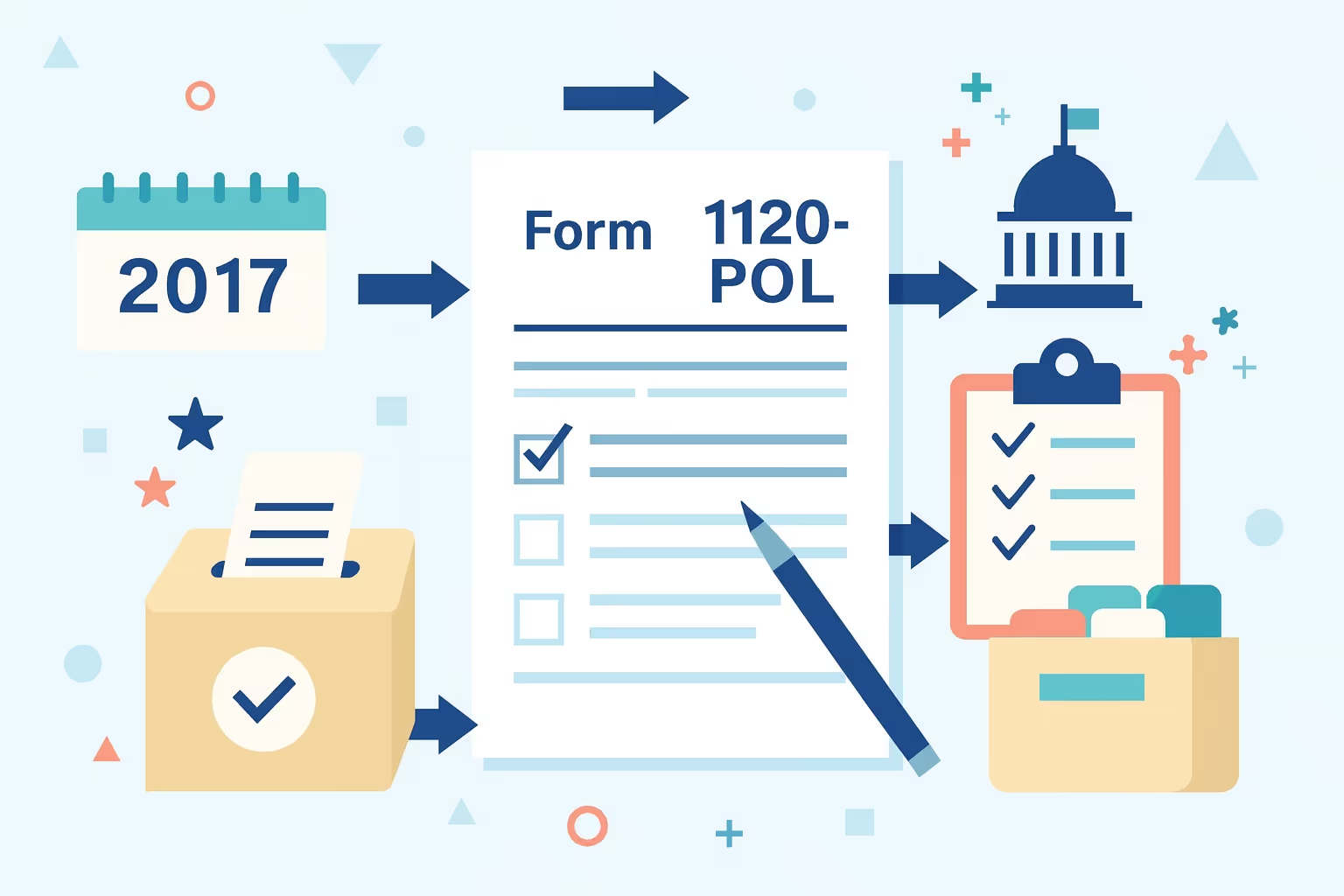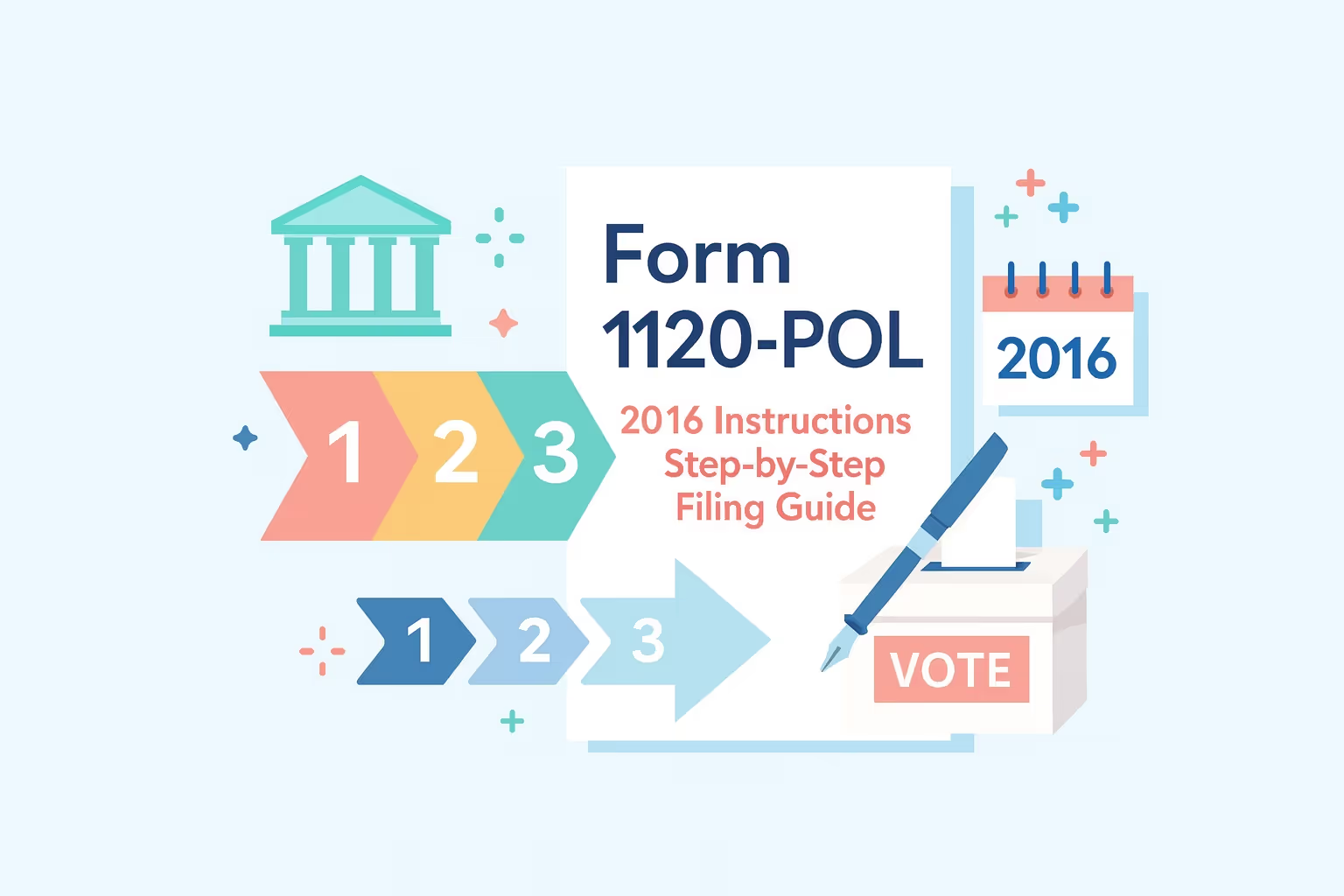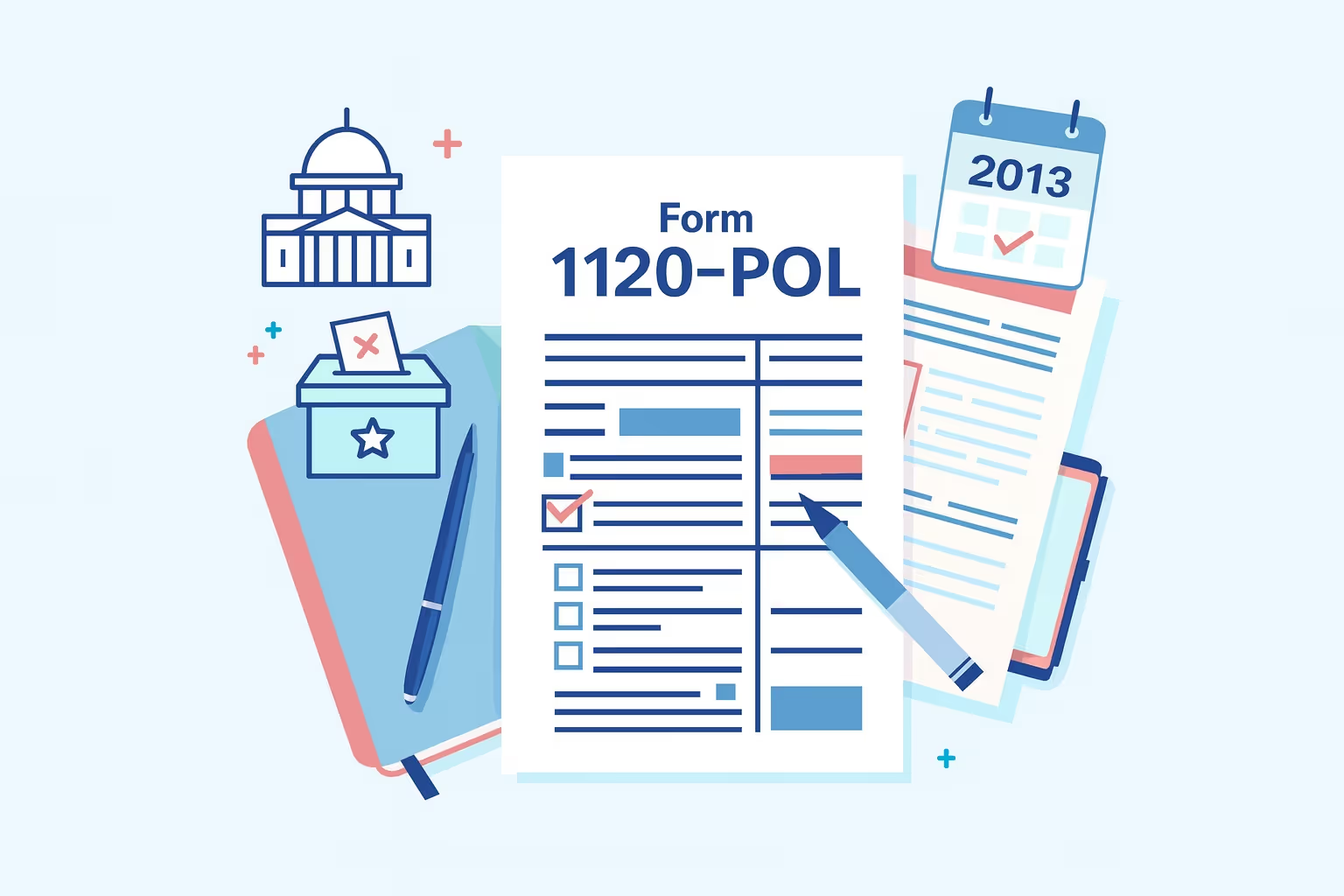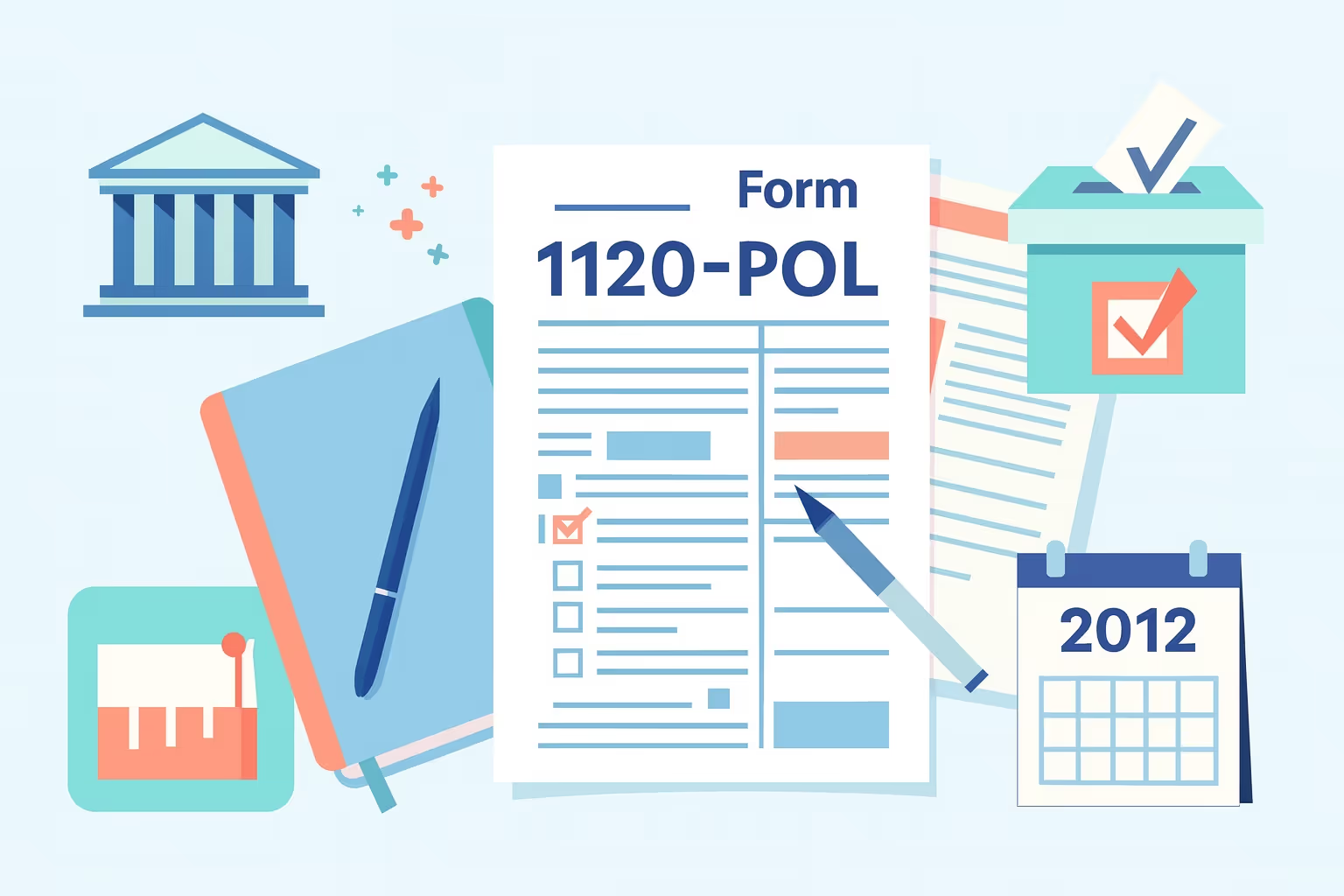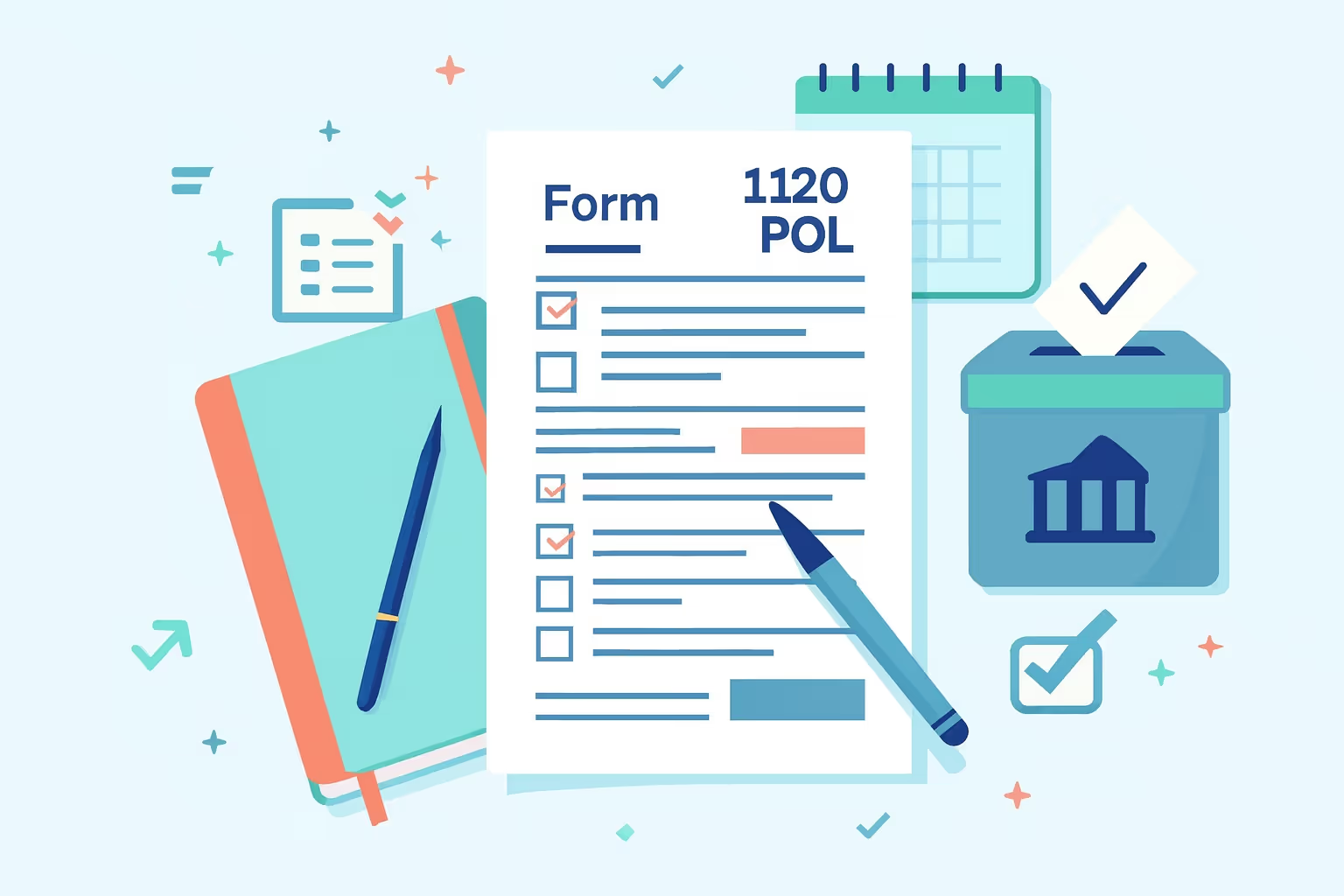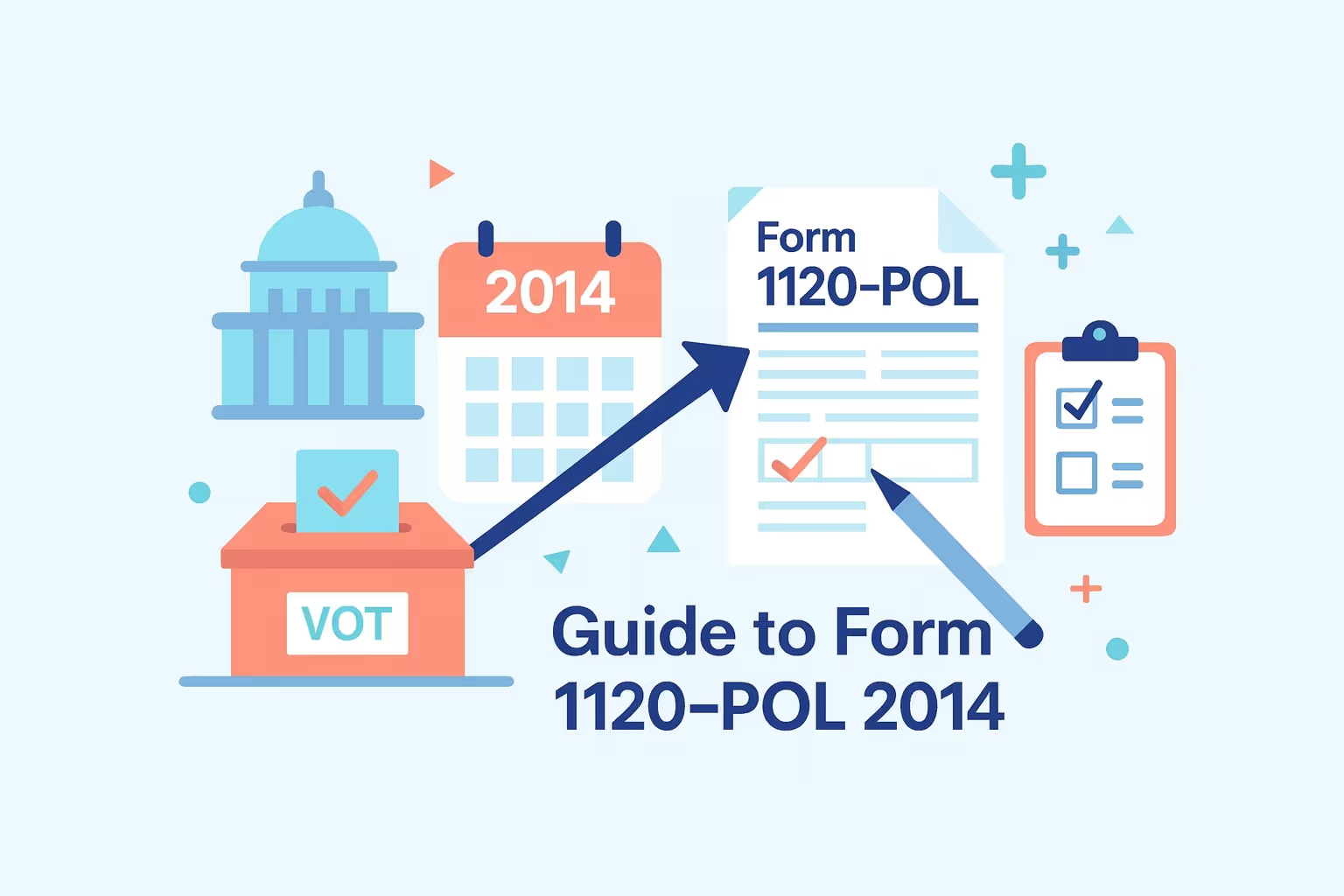
Filing IRS Form 1120-POL for the 2014 tax year is an essential step for political organizations that are required to submit an income tax return under the Internal Revenue Code. This form applies to groups that have taxable income from investments or other non-exempt sources, even if their primary purpose is related to elections or campaign activities. While some organizations may assume they are fully exempt, the Internal Revenue Service requires accurate reporting whenever income is earned outside of exempt functions.
Understanding how to file correctly helps organizations avoid common mistakes and ensures compliance with tax filing requirements. The 2014 version of the form included updates such as electronic payment rules and expanded options for filing, making it essential for users to review instructions specific to that year. Whether filing electronically or on paper, organizations must prepare financial information in advance, account for deductions, and complete required schedules to avoid errors.
This guide explains the process in simple terms, offering practical guidance on deadlines, payments, and common errors to watch for. By learning how to file correctly, political organizations can meet their obligations while protecting their tax-exempt status. Clear steps, examples, and answers to frequent questions provide the support needed to prepare, file, and complete the return with accuracy. For those who are uncertain, expert help and IRS resources remain available to provide clarification and assistance.
Understanding IRS Form 1120-POL
Form 1120-POL is the income tax return that specific political organizations must file when they earn taxable income. Under the Internal Revenue Code, organizations created for election-related purposes are generally exempt from tax on contributions and other income derived from exempt functions. However, when money is earned from sources such as dividends, interest, or rental property, the IRS requires that income to be reported on this form.
Who Must File?
Organizations are required to file Form 1120-POL if they meet any of these conditions:
- A political organization earns taxable income from investments or non-exempt activities during the year. This includes interest, dividends, and business income not directly tied to exempt purposes.
- A Section 501(c) organization spends money on political activities. Even though the group may not be primarily political, certain expenditures can trigger a filing requirement.
- An exempt organization is treated as having political organization taxable income under Section 527.
Types of Political Organizations
- Principal campaign committees are the official committees designated by candidates for the U.S. Congress. They file Form 1120-POL when taxable income is earned.
- Newsletter funds are accounts maintained exclusively for the purpose of covering the costs of preparing and distributing newsletters. They are also subject to filing rules when taxable income exists.
- Separate segregated funds are established by Section 501(c) tax-exempt organizations to handle political contributions and related spending.
Filing may not be required if the organization has no taxable income. However, many groups still choose to file even in dormant years to begin the statute of limitations period, establish compliance with IRS rules, and maintain accurate records for future reference.
What’s New for the 2014 Tax Year?
The 2014 version of Form 1120-POL introduced several updates that affect how political organizations file and pay their income tax returns. These changes were designed to simplify the process and encourage the use of electronic systems for greater accuracy.
Key updates include:
- Organizations with a balance due became eligible to apply online for an installment agreement if the total owed was below the IRS limit.
- Electronic filing continued to expand, giving organizations faster confirmation and reducing processing delays.
- All federal tax deposits had to be made through the Electronic Federal Tax Payment System (EFTPS), replacing earlier paper-based deposit options.
- The form clarified rules on political organization taxable income and added stricter requirements for reporting foreign financial accounts.
These adjustments highlight the IRS's push toward electronic processes and stricter compliance with financial reporting obligations. Organizations filing for 2014 needed to understand these changes to avoid penalties or errors when completing their returns.
Filing Requirements and Deadlines
Political organizations must follow IRS rules that specify when a tax return is due and what time periods are covered. Fiscal-year filers, the 2014 Form 1120-POL covered the period from January 1 to December 31, 2014. Fiscal year filers used the same form if their year began in 2014 and ended in 2015. Short-year filers could also use the 2014 form if the 2015 version was not yet available.
Important deadlines include:
- The due date for calendar year filers was March 16, 2015, which fell on the 15th day of the third month following the end of the year.
- If the due date falls on a weekend or a federal holiday, the next business day applies.
- Extensions of up to six months were available by filing Form 7004 on or before the original deadline.
Meeting deadlines is essential to avoid late filing penalties. Filing on time also ensures the statute of limitations period begins, protecting the organization from extended review.
Step-by-Step Instructions to Complete Form 1120-POL
Completing Form 1120-POL requires accurate financial information and attention to detail. Political organizations should prepare documents such as bank statements, contribution records, and expenditure receipts before starting.
- Header Information: Enter the organization’s legal name, Employer Identification Number, address, and tax year. Indicate whether the return is final, amended, or includes changes.
- Income Section: Report taxable income, such as dividends, interest, rental income, or other non-exempt activities. Contributions used for exempt purposes should not be included.
- Deductions: List expenses directly related to taxable income, including salaries, rent, repairs, taxes, interest, and depreciation. Exempt function expenses are not deductible.
- Taxable Income Calculation: Subtract deductions from income, then apply the $100 specific deduction where eligible. Newsletter funds are not allowed this deduction.
- Tax Liability: Calculate tax owed. Political organizations generally pay 35 percent of taxable income, while principal campaign committees use graduated corporate tax rates.
- Signature and Verification: An authorized officer must sign and date the return, confirming accuracy under penalty of perjury.
Completing each section accurately ensures that the return reflects the correct taxable income and deductions. Organizations should double-check all data and schedules before submitting the form to avoid errors that may delay processing or create compliance issues.
How to File Form 1120-POL?
Political organizations have two main options when filing Form 1120-POL: electronic filing and paper filing. The IRS strongly encourages electronic filing because it provides faster processing, immediate confirmation, and fewer errors. Paper filing is still permitted, but it requires more time and demands careful attention to details such as mailing addresses and signatures.
Electronic Filing
- Electronic filing is processed more quickly than paper returns, and the IRS sends confirmation once the return is received.
- Using IRS-approved tax preparation software helps organizations identify and correct mistakes before submitting the form.
- E-filing provides a secure method for transmitting financial information, allowing organizations to track their submissions.
Paper Filing
- Paper returns for the 2014 tax year were mailed to the IRS Service Center in Ogden, Utah. This method generally takes longer to process than electronic filing.
- The IRS also permitted private delivery services such as FedEx, UPS, and DHL, but only if they were approved carriers listed on the IRS website.
- Payments cannot be included with a paper return. Instead, all payments must be submitted electronically through EFTPS.
While paper filing remains an option, electronic filing is usually the best choice for accuracy and efficiency. Regardless of the filing method, organizations must ensure the return is complete, signed by an authorized officer, and includes all required attachments.
Payment Instructions
When a political organization owes taxes, it must pay electronically, as the IRS no longer accepts payments submitted with a paper return. The standard method is the Electronic Federal Tax Payment System (EFTPS), which the U.S. Department of the Treasury operates. Enrollment requires providing account information, after which the IRS mails a personal identification number that allows payments to be scheduled.
Payment Options
- Electronic Federal Tax Payment System (EFTPS): This is the primary payment method for federal tax deposits. Payments must be scheduled by 8:00 p.m. Eastern time on the business day before the due date to be considered timely.
- Same-day wire transfer: Organizations that face a deadline can arrange a same-day wire transfer through their financial institution. Additional fees may apply.
- Third-party providers: Some organizations rely on tax experts, payroll companies, or banks to make payments electronically on their behalf.
- Installment agreements: If an organization owes $25,000 or less and can pay within 24 months, it may request an online installment agreement through the IRS website.
Making timely payments is critical for avoiding penalties and interest. Planning ensures compliance and prevents unnecessary financial problems for the organization.
Required Schedules and Attachments
Many organizations that file Form 1120-POL must also attach schedules or additional IRS forms. These documents allow the IRS to verify reported amounts and confirm that deductions and income are calculated correctly.
Commonly Required Forms
- Form 4562: This form must be filed if the organization is claiming depreciation or amortization for assets used in its operations. It explains how deductions were determined.
- Schedule D (Form 1120): This schedule is required when an organization has capital gains or losses from the sale of investments or other assets.
- Form 4797: Organizations must use this form if they have gains or losses from selling or exchanging business property that is not a capital asset.
- Form 4136: This form is needed if the organization is claiming a credit for federal excise taxes paid on fuels.
Required Statements
When filing Form 1120-POL, organizations must include clear and detailed statements to support the information reported on the return. These statements allow the IRS to verify that income, deductions, and expenditures have been calculated correctly.
- Dividend income must be reported with full details, including the payer’s name, the type of dividend received, and the exact dollar amount. This information helps the IRS confirm the source and classification of the income.
- Other deductions must be itemized to show both the type of expense and the total amount claimed. Itemizing deductions ensures transparency and reduces the chance of errors or misinterpretation.
- Exempt function expenditures must be supported by a calculation that explains how the organization arrived at the reported figure. Providing this breakdown demonstrates that the expenses were appropriately evaluated.
- Principal campaign committees may need to attach documentation from the Federal Election Commission, such as a signed statement of candidacy, to their filings. These records confirm the committee’s official designation and status.
Submitting accurate and complete statements allows the IRS to review the return efficiently. Missing or incomplete attachments often result in follow-up requests, which can delay processing and increase the administrative burden on the organization.
Common Mistakes to Avoid
Completing Form 1120-POL requires precision. Even minor errors can lead to penalties, additional IRS correspondence, or delays in processing. By understanding common pitfalls, political organizations can avoid issues that often complicate the tax filing process.
Filing Errors
- Many organizations fail to specify the correct tax year on their returns. When this happens, the IRS may reject the filing or require resubmission.
- Some filers provide an incomplete or incorrect Employer Identification Number (EIN). This error prevents the IRS from properly associating the return with the organization.
- Unsigned returns are automatically considered invalid. Even if the financial data is complete, the lack of an authorized signature makes the filing unacceptable.
- Using an incorrect mailing address or forgetting to attach required schedules can result in processing delays or rejected submissions.
Calculation Errors
- A frequent mistake occurs when organizations include exempt function income, such as campaign contributions, in taxable income calculations. This results in overreporting and unnecessary tax liability.
- Campaign expenditures are sometimes deducted incorrectly. These expenses are not deductible because they are exempt function expenditures.
- Misapplying tax rates is a standard error. Political organizations are generally subject to a flat 35 percent rate, while principal campaign committees must use graduated corporate tax rates.
- Many organizations overlook the $100 specific deduction, which can reduce taxable income and, in some cases, eliminate the tax owed entirely.
Taking time to review calculations, verify details, and confirm signatures helps ensure that the return is both accurate and complete. Organizations can further reduce the risk of mistakes by consulting IRS instructions or seeking professional assistance.
Zero Activity / Dormant Year Guidance
Not all political organizations generate taxable income every year. Some groups may only engage in exempt activities, such as receiving campaign contributions and funding campaign operations, which makes them dormant for tax purposes. It is essential to understand when filing is required and when it is optional.
When Filing Is Not Required?
- Filing Form 1120-POL is not necessary if taxable income is zero or less for the year.
- Organizations that engage solely in exempt function activities, such as fundraising and campaign expenses, are exempt from filing tax returns.
- If an organization properly filed Form 8871, exempt function income is excluded from taxation and does not trigger a filing requirement.
When Filing May Still Be Beneficial?
- Filing even with no taxable income starts the statute of limitations period, which limits how long the IRS can review the return.
- Submitting a return creates an official record of compliance and demonstrates good faith in meeting IRS obligations.
- Establishing a filing history can protect the organization in future audits or inquiries.
Special Situations
- Organizations that earn small amounts of investment income may offset it using the $100 specific deduction, effectively eliminating taxable income.
- Failure to file Form 8871 on time can cause all exempt function income to be treated as taxable until the form is submitted.
- Organizations that dissolve or terminate must still file a final return, even if they have no taxable income for the year.
Filing in dormant years is often a prudent step. It provides transparency, establishes compliance, and prevents complications if the IRS raises questions later.
First-Time Filer Tips
Filing Form 1120-POL for the first time can be a challenging process. However, with the proper preparation, organizations can reduce stress, meet deadlines, and maintain compliance with IRS requirements.
Essential Setup
- An Employer Identification Number (EIN) is required before an organization can file its tax return. This number identifies the group for tax purposes.
- New organizations must file Form 8871 within 24 hours of formation. This filing establishes or confirms their tax-exempt status under Section 527 of the Internal Revenue Code.
- Setting up a separate bank account and a recordkeeping system helps track income and expenditures clearly, preventing errors in reporting.
Compliance Checklist
- Form 8872 must be filed regularly to report political contributions and expenditures.
- Form 1120-POL must be filed each year if the organization has taxable income.
- Organizations with gross receipts of $25,000 or more are generally required to file Form 990 or Form 990-EZ, unless an exception applies.
- Copies of all filings and reports should be maintained for public inspection as required by IRS regulations.
Understanding Income and Expenses
- Exempt function income includes campaign contributions, membership dues, and fundraising activities. These amounts are not subject to tax.
- Taxable income includes sources such as interest, dividends, rental income, and business income that is not segregated from political funds.
- Deductible expenses are limited to those directly related to earning taxable income. Examples include investment management fees, depreciation, and operating costs for rental property.
By establishing strong recordkeeping practices and understanding what constitutes taxable income, new organizations can file with confidence. Seeking expert help or reviewing IRS guidance can further reduce the risk of errors during the first year of filing.
Frequently Asked Questions
Where can organizations find the Form 1120-POL 2014?
The Form 1120-POL 2014 instructions are available on the IRS website and can be downloaded as free IRS forms in PDF format. These instructions outline the steps to prepare the income tax return, specify the required financial information, and detail the allowable deductions and expenditures. By following each step carefully, an organization can complete the form with accuracy and avoid problems that delay tax filing.
How does filing Form 1120-POL affect tax-exempt status?
Filing Form 1120-POL does not cancel tax-exempt status under the Internal Revenue Code. The income tax return applies only when taxable income, such as interest or dividends, is earned outside of exempt activities. Completing the form with the correct data helps the IRS confirm that the organization followed the rules. Using the instructions, schedules, and expert help ensures the return is complete and meets agency requirements.
What information is required to file the tax return correctly?
To file their income tax return, organizations must gather complete and accurate financial information. This includes taxable income, contribution data, investment statements, and expenditures related to political activities. They must also prepare a list of deductions directly connected to generating taxable income. Schedules and supporting forms are required attachments. Reviewing the instructions and checking every page ensures that users submit an accurate return that the IRS can process without clarification.
What is the deadline to file and pay taxes under Form 1120-POL?
The deadline for the 2014 tax year was March 16, 2015, but the due date changes depending on the organization’s fiscal year. Taxes must be paid electronically through EFTPS and not mailed with the return. Organizations should sign the form, upload the required schedules, and make timely payments to avoid penalties. IRS software and expert guidance help filers complete the process correctly, ensuring the agency records both the return and payment.
Can tax experts help organizations maximize accuracy and refunds?
Tax experts provide valuable guidance for organizations completing IRS forms and income tax returns. They can review deductions, expenses, and exemptions to ensure the form is filled out correctly. Expert help also assists with downloading instructions, printing schedules, and preparing financial data. While Form 1120-POL rarely results in a max refund, accuracy in tax filing prevents penalties and ensures the IRS processes the return quickly and without problems.
Are there free options to prepare and file Form 1120-POL?
Yes, the IRS offers free software options that enable users to prepare, complete, and file their return online. These tools guide organizations step by step through the process, check for errors, and ensure schedules are attached. Organizations can print a copy for their records and upload financial information directly. Free filing may be suitable for small groups, while larger organizations may prefer expert help to handle complex expenses and exemptions.












